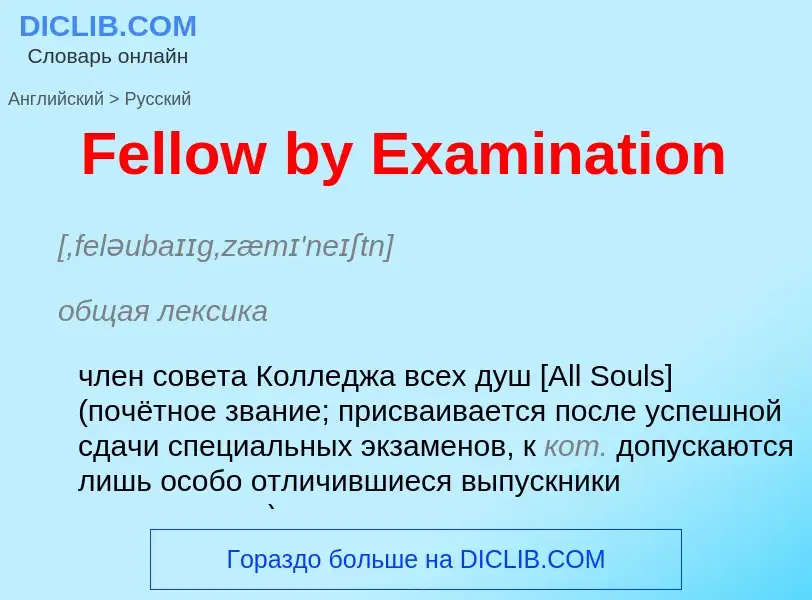Translation and analysis of words by ChatGPT artificial intelligence
On this page you can get a detailed analysis of a word or phrase, produced by the best artificial intelligence technology to date:
- how the word is used
- frequency of use
- it is used more often in oral or written speech
- word translation options
- usage examples (several phrases with translation)
- etymology
Fellow by Examination - translation to russian
[,feləubaɪɪg,zæmɪ'neɪʃtn]
общая лексика
член совета Колледжа всех душ [All Souls] (почётное звание; присваивается после успешной сдачи специальных экзаменов, к кот. допускаются лишь особо отличившиеся выпускники университета)
[feləu'træv(ə)lə]
общая лексика
спутник
неодобрительное выражение
сочувствующий (политической партии)
попутчик
Definition
Wikipedia
The term fellow traveller (also fellow traveler) identifies a person who is intellectually sympathetic to the ideology of a political organization, and who co-operates in the organization's politics, without being a formal member of that organization. In the early history of the Soviet Union, the Bolshevik revolutionary and Soviet statesman Anatoly Lunacharsky coined the term poputchik ('one who travels the same path') and later it was popularized by Leon Trotsky to identify the vacillating intellectual supporters of the Bolshevik government. It was the political characterisation of the Russian intelligentsiya (writers, academics, and artists) who were philosophically sympathetic to the political, social, and economic goals of the Russian Revolution of 1917, but who did not join the Communist Party of the Soviet Union. The usage of the term poputchik disappeared from political discourse in the Soviet Union during the Stalinist régime, but the Western world adopted the English term fellow traveller to identify people who sympathised with the Soviets and with Communism.
In U.S. politics, during the 1940s and the 1950s, the term fellow traveler was a pejorative term for a person who was philosophically sympathetic to Communism, yet was not a formal, "card-carrying member" of the Communist Party USA. In political discourse, the term fellow traveler was applied to intellectuals, academics, and politicians who lent their names and prestige to Communist front organizations.
In European politics, the equivalent terms for fellow traveller are: Compagnon de route and sympathisant in France; Weggenosse, Sympathisant (neutral) or Mitläufer (negative connotation) in Germany; and compagno di strada in Italy.

